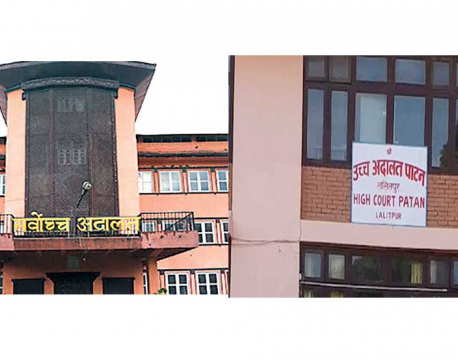
OR
#Editorial
Tackling the Staggering Backlog of Cases in Courts
Published On: February 23, 2024 07:30 AM NPT By: Republica | @RepublicaNepal

The Supreme Court (SC) has witnessed a threefold increase in court cases in the past decade. According to the annual report for the fiscal year 2079/80 BS released on Wednesday, a total of 158,147 cases are currently pending across the country. Last year, all courts and tribunals collectively handled 325,702 cases. In the fiscal year 2079/80 BS, this number rose to 360,576, marking a 10.71 percent increase. The workload ratio for the High Court has surged by 89.36 percent over the past decade, primarily due to delays in judge appointments. Anticipating a continued rise in the number of cases, the country's judiciary is under additional pressure to settle cases promptly. While acknowledging the challenge posed by the sharp increase in cases, the SC attributes the painfully slow case clearance to the failure to appoint judges at all three tiers of the court. Regardless of the reasons behind this backlog, it is a troubling development. All stakeholders must urgently work together to address this situation, as justice delayed is tantamount to justice denied.
The judiciary's image is marred by its struggle to provide timely judgments, primarily due to several challenges. Firstly, there is a reluctance to adopt information technology for efficient case management, leading to corruption, unchecked employee activity, and duplicated efforts. Secondly, the appointment of judges across all levels poses a significant bottleneck in the decision-making process. The lack of specialization in the composition of benches, with cases assigned randomly, also results in unnecessary delays. Experts see time management during court proceedings, especially in high-profile or complex cases, hindered by numerous lawyers prolonging proceedings. Lastly, inadequate infrastructure, human resources, and budgetary allocations contribute to prolonged administrative tasks, hindering the swift resolution of cases. Addressing these issues is essential for restoring the judiciary's credibility and ensuring the timely delivery of justice.
Needless to say, the challenges linked to the increasing caseload of the courts are intricate and varied, involving issues like resource allocation, centralization of jurisdiction, diversion of judicial expertise, and unpredictable judge transfers. A comprehensive and thoughtful approach is required to tackle these challenges, focusing on enhancing the judiciary's capacity to efficiently manage its caseload and ensure timely and effective justice administration. These difficulties have contributed to a decline in public trust in the judiciary, with citizens now viewing it as one of the most corrupt institutions in Nepal. To restore faith in the judiciary, it is crucial to address these challenges, particularly by promptly clearing the backlog of cases. Failing to deliver justice on time is seen as equivalent to denying justice altogether. In the pursuit of a just and thriving democracy, systematic reform and a commitment to efficiency are essential to rebuilding eroded trust and reaffirming the judiciary's role as the guardian of democratic values. It is crucial for all relevant stakeholders to collaborate towards this goal.
You May Like This

Judicial Council recommends six candidates for the appointment of SC justices
KATHMANDU, Nov 21: A meeting of the Judicial Council (JC) held on Tuesday recommends six candidates for the vacant Supreme... Read More...

SC's letter seeking detailed report on Sandeep Lamichhane’s case yet to reach Patan High Court even after 11 days
KATHMANDU, Feb 13: A letter written by the Supreme Court (SC) demanding the grounds and reasons for releasing the rape-accused... Read More...

HC judges take oath amid controversy
KATHMANDU, April 11: Seventeen High Court judges took oath of office and secrecy on Wednesday in the presence of Chief Justice... Read More...









Just In
- Heavy rainfall likely in Bagmati and Sudurpaschim provinces
- Bangladesh protest leaders taken from hospital by police
- Challenges Confronting the New Coalition
- NRB introduces cautiously flexible measures to address ongoing slowdown in various economic sectors
- Forced Covid-19 cremations: is it too late for redemption?
- NRB to provide collateral-free loans to foreign employment seekers
- NEB to publish Grade 12 results next week
- Body handover begins; Relatives remain dissatisfied with insurance, compensation amount








Leave A Comment